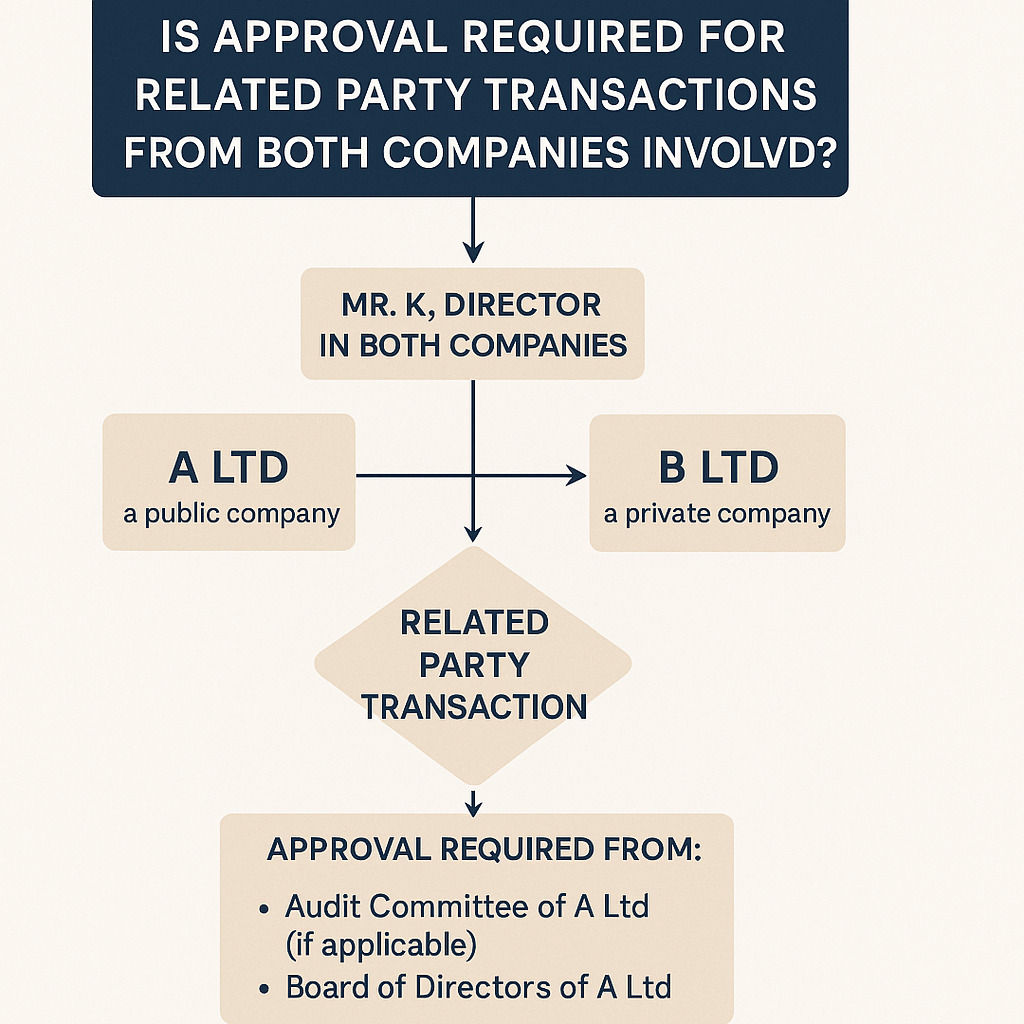View News
Is-Approval-Required-for-Related-Party-Transactions-from-Both-Companies-Involved

Is Approval Required for Related Party Transactions from Both Companies Involved?
Introduction:
Related party transactions are a crucial aspect of corporate governance and are subject to stringent regulations under the Companies Act, 2013. These transactions are closely monitored to ensure transparency and fairness, particularly when one party has significant influence or control over the other. But what happens when two companies, one being public and the other private, engage in a related party transaction? Is approval required from both companies involved.
In this article, we will explore the nuances of related party transactions and determine whose approval is necessary when a public company enters into a transaction with a private company, specifically under the scenario where one individual holds positions in both entities.
The Scenario:
Let’s take a practical example:
A Ltd is a public company.
B Ltd is a private company.
Mr. K, who is a director at A Ltd, holds less than 2% of the shares in A Ltd but is also a director and member of B Ltd.
Given that Mr. K is involved with both companies, this scenario creates a related party transaction between A Ltd and B Ltd. The question arises: whose approval is required? Should approval be sought from A Ltd, B Ltd, or both?
Understanding Related Party Transactions:
The Companies Act, 2013 defines a related party transaction as any transaction between a company and its directors, key managerial personnel (KMP), or entities in which these individuals have a significant influence. This also includes their relatives, subsidiaries, and associated companies. The law mandates that related party transactions are subject to specific approval mechanisms to ensure that there is no abuse of power or conflicts of interest.
In this context, we need to understand the following two clauses to analyze the situation:
Section 2(76)
Clause (iv): A private company where a director or manager (or their relative) is a member or director is considered a related party.
Clause (v): A public company where a director or manager holds more than 2% of its paid-up share capital (along with their relatives) is considered a related party.
Analyzing the Example:
To determine whether the transaction between A Ltd and B Ltd qualifies as a related party transaction, let's break it down:
A Ltd is a public company, and Mr. K holds less than 2% of its shares. Therefore, A Ltd does not consider Mr. K’s involvement in B Ltd to make B Ltd a related party to A Ltd.
On the other hand, B Ltd is a private company, and Mr. K is both a director and member of B Ltd. As per Clause (iv), B Ltd qualifies as a related party to A Ltd because a director of A Ltd (Mr. K) is also a member and director of B Ltd.
Thus, while B Ltd qualifies as a related party to A Ltd, A Ltd does not qualify as a related party to B Ltd.
What Approvals Are Required?
When it comes to related party transactions, the law outlines a clear process for obtaining approvals:
Audit Committee Approval: If the company has an Audit Committee, they must review the proposed related party transaction and approve it. This is an important safeguard to ensure transparency and fairness.
Board Approval: In cases where the transaction exceeds a certain threshold or involves significant financial value, board approval is required. The board must review the nature of the transaction and ensure it aligns with the company’s best interests.
Shareholder Approval: If the transaction exceeds a prescribed value or falls under specific categories outlined in the Companies Act, shareholder approval may also be required, especially if the transaction is likely to affect the voting rights or interests of the shareholders.
Applying the Rules to the Example:
Since B Ltd is a related party to A Ltd, the necessary approvals must be obtained from A Ltd. Specifically:
The Audit Committee of A Ltd (if applicable) should review and approve the transaction. The Board of Directors of A Ltd must also approve the transaction. Depending on the materiality of the transaction, shareholder approval may be required as well.
B Ltd, however, does not need to seek approval for the transaction, as A Ltd is not considered a related party to B Ltd. The related party transaction approval process is applicable only to the company that is engaging with a related party, which, in this case, is A Ltd.
Conclusion:
In the scenario where a public company (A Ltd) enters into a related party transaction with a private company (B Ltd), approval is only required from A Ltd, as B Ltd is considered a related party to A Ltd but not vice versa. The approval must go through the appropriate channels at A Ltd, such as the Audit Committee, Board of Directors, and possibly the shareholders, depending on the specifics of the transaction.
DISCLAIMER:
THE CONTENTS OF THIS DOCUMENT ARE BASED ON THE CURRENT PROVISIONS OF THE COMPANIES ACT, 2013, AND THE INFORMATION AVAILABLE AT THE TIME OF WRITING. EVERY EFFORT HAS BEEN MADE TO ENSURE ACCURACY AND RELIABILITY. HOWEVER, NO RESPONSIBILITY IS ASSUMED FOR ANY ERRORS OR OMISSIONS. USERS ARE ENCOURAGED TO CONSULT APPLICABLE LAWS AND REGULATIONS FOR DETAILED GUIDANCE. THIS INFORMATION DOES NOT CONSTITUTE LEGAL ADVICE, AND NO LIABILITY IS ACCEPTED FOR ANY CONSEQUENCES ARISING FROM ITS USE.
From the desk of CS Sharath

